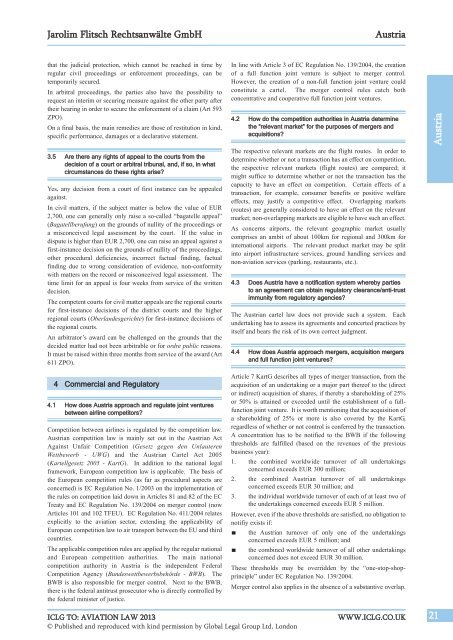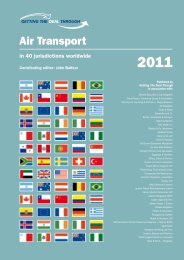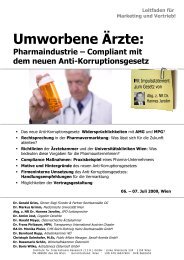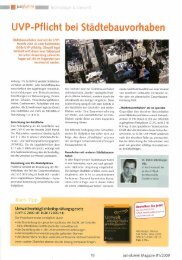The International Comparative Legal Guide to Aviation Law ... - Jarolim
The International Comparative Legal Guide to Aviation Law ... - Jarolim
The International Comparative Legal Guide to Aviation Law ... - Jarolim
You also want an ePaper? Increase the reach of your titles
YUMPU automatically turns print PDFs into web optimized ePapers that Google loves.
<strong>Jarolim</strong> Flitsch Rechtsanwälte GmbH<br />
Austria<br />
that the judicial protection, which cannot be reached in time by<br />
regular civil proceedings or enforcement proceedings, can be<br />
temporarily secured.<br />
In arbitral proceedings, the parties also have the possibility <strong>to</strong><br />
request an interim or securing measure against the other party after<br />
their hearing in order <strong>to</strong> secure the enforcement of a claim (Art 593<br />
ZPO).<br />
On a final basis, the main remedies are those of restitution in kind,<br />
specific performance, damages or a declarative statement.<br />
3.5 Are there any rights of appeal <strong>to</strong> the courts from the<br />
decision of a court or arbitral tribunal, and, if so, in what<br />
circumstances do these rights arise?<br />
Yes, any decision from a court of first instance can be appealed<br />
against.<br />
In civil matters, if the subject matter is below the value of EUR<br />
2,700, one can generally only raise a so-called “bagatelle appeal”<br />
(Bagatellberufung) on the grounds of nullity of the proceedings or<br />
a misconceived legal assessment by the court. If the value in<br />
dispute is higher than EUR 2,700, one can raise an appeal against a<br />
first-instance decision on the grounds of nullity of the proceedings,<br />
other procedural deficiencies, incorrect factual finding, factual<br />
finding due <strong>to</strong> wrong consideration of evidence, non-conformity<br />
with matters on the record or misconceived legal assessment. <strong>The</strong><br />
time limit for an appeal is four weeks from service of the written<br />
decision.<br />
<strong>The</strong> competent courts for civil matter appeals are the regional courts<br />
for first-instance decisions of the district courts and the higher<br />
regional courts (Oberlandesgerichte) for first-instance decisions of<br />
the regional courts.<br />
An arbitra<strong>to</strong>r’s award can be challenged on the grounds that the<br />
decided matter had not been arbitrable or for ordre public reasons.<br />
It must be raised within three months from service of the award (Art<br />
611 ZPO).<br />
In line with Article 3 of EC Regulation No. 139/2004, the creation<br />
of a full function joint venture is subject <strong>to</strong> merger control.<br />
However, the creation of a non-full function joint venture could<br />
constitute a cartel. <strong>The</strong> merger control rules catch both<br />
concentrative and cooperative full function joint ventures.<br />
4.2 How do the competition authorities in Austria determine<br />
the “relevant market” for the purposes of mergers and<br />
acquisitions?<br />
<strong>The</strong> respective relevant markets are the flight routes. In order <strong>to</strong><br />
determine whether or not a transaction has an effect on competition,<br />
the respective relevant markets (flight routes) are compared; it<br />
might suffice <strong>to</strong> determine whether or not the transaction has the<br />
capacity <strong>to</strong> have an effect on competition. Certain effects of a<br />
transaction, for example, consumer benefits or positive welfare<br />
effects, may justify a competitive effect. Overlapping markets<br />
(routes) are generally considered <strong>to</strong> have an effect on the relevant<br />
market; non-overlapping markets are eligible <strong>to</strong> have such an effect.<br />
As concerns airports, the relevant geographic market usually<br />
comprises an ambit of about 100km for regional and 300km for<br />
international airports. <strong>The</strong> relevant product market may be split<br />
in<strong>to</strong> airport infrastructure services, ground handling services and<br />
non-aviation services (parking, restaurants, etc.).<br />
4.3 Does Austria have a notification system whereby parties<br />
<strong>to</strong> an agreement can obtain regula<strong>to</strong>ry clearance/anti-trust<br />
immunity from regula<strong>to</strong>ry agencies?<br />
<strong>The</strong> Austrian cartel law does not provide such a system. Each<br />
undertaking has <strong>to</strong> assess its agreements and concerted practices by<br />
itself and bears the risk of its own correct judgment.<br />
4.4 How does Austria approach mergers, acquisition mergers<br />
and full function joint ventures?<br />
Austria<br />
4 Commercial and Regula<strong>to</strong>ry<br />
4.1 How does Austria approach and regulate joint ventures<br />
between airline competi<strong>to</strong>rs?<br />
Competition between airlines is regulated by the competition law.<br />
Austrian competition law is mainly set out in the Austrian Act<br />
Against Unfair Competition (Gesetz gegen den Unlauteren<br />
Wettbewerb - UWG) and the Austrian Cartel Act 2005<br />
(Kartellgesetz 2005 - KartG). In addition <strong>to</strong> the national legal<br />
framework, European competition law is applicable. <strong>The</strong> basis of<br />
the European competition rules (as far as procedural aspects are<br />
concerned) is EC Regulation No. 1/2003 on the implementation of<br />
the rules on competition laid down in Articles 81 and 82 of the EC<br />
Treaty and EC Regulation No. 139/2004 on merger control (now<br />
Articles 101 and 102 TFEU). EC Regulation No. 411/2004 relates<br />
explicitly <strong>to</strong> the aviation sec<strong>to</strong>r, extending the applicability of<br />
European competition law <strong>to</strong> air transport between the EU and third<br />
countries.<br />
<strong>The</strong> applicable competition rules are applied by the regular national<br />
and European competition authorities. <strong>The</strong> main national<br />
competition authority in Austria is the independent Federal<br />
Competition Agency (Bundeswettbewerbsbehörde - BWB). <strong>The</strong><br />
BWB is also responsible for merger control. Next <strong>to</strong> the BWB,<br />
there is the federal antitrust prosecu<strong>to</strong>r who is directly controlled by<br />
the federal minister of justice.<br />
Article 7 KartG describes all types of merger transaction, from the<br />
acquisition of an undertaking or a major part thereof <strong>to</strong> the (direct<br />
or indirect) acquisition of shares, if thereby a shareholding of 25%<br />
or 50% is attained or exceeded until the establishment of a fullfunction<br />
joint venture. It is worth mentioning that the acquisition of<br />
a shareholding of 25% or more is also covered by the KartG,<br />
regardless of whether or not control is conferred by the transaction.<br />
A concentration has <strong>to</strong> be notified <strong>to</strong> the BWB if the following<br />
thresholds are fulfilled (based on the revenues of the previous<br />
business year):<br />
1. the combined worldwide turnover of all undertakings<br />
concerned exceeds EUR 300 million;<br />
2. the combined Austrian turnover of all undertakings<br />
concerned exceeds EUR 30 million; and<br />
3. the individual worldwide turnover of each of at least two of<br />
the undertakings concerned exceeds EUR 5 million.<br />
However, even if the above thresholds are satisfied, no obligation <strong>to</strong><br />
notifiy exists if:<br />
the Austrian turnover of only one of the undertakings<br />
concerned exceeds EUR 5 million; and<br />
the combined worldwide turnover of all other undertakings<br />
concerned does not exceed EUR 30 million.<br />
<strong>The</strong>se thresholds may be overridden by the “one-s<strong>to</strong>p-shopprinciple”<br />
under EC Regulation No. 139/2004.<br />
Merger control also applies in the absence of a substantive overlap.<br />
ICLG TO: AVIATION LAW 2013<br />
© Published and reproduced with kind permission by Global <strong>Legal</strong> Group Ltd, London<br />
WWW.ICLG.CO.UK<br />
21





